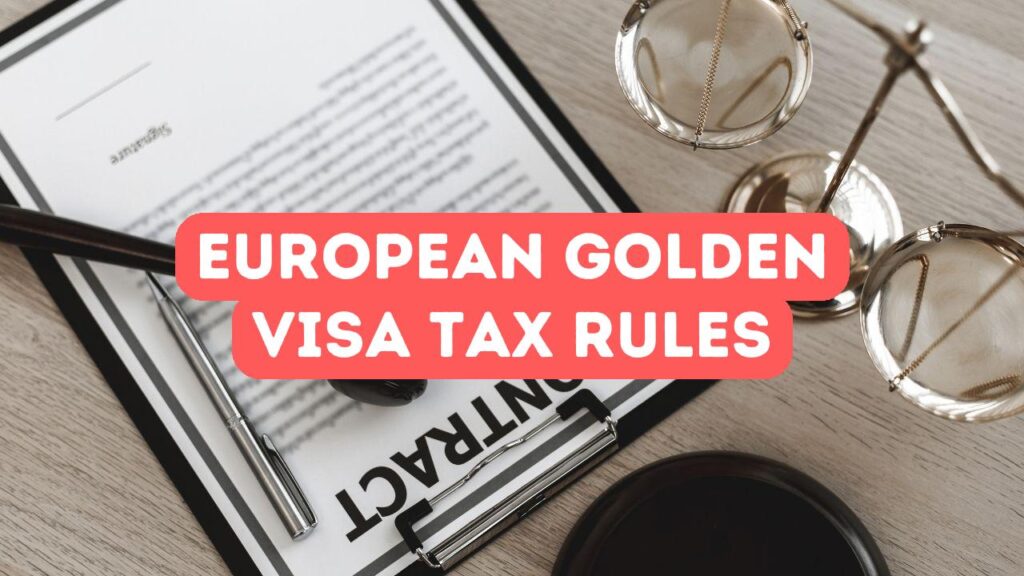Navigating the tax implications of European Golden Visas can feel like wading through a financial jungle. Understanding how EU residency taxes interplay with investing in Europe is crucial. Did you know that a European Golden Visa not only grants residency but also opens doors to unique tax advantages? However, these benefits aren’t a one-size-fits-all package. Varying rules across countries like Portugal, Spain, and Greece make it essential for applicants to study the local tax landscape. Exploring the Golden Visa benefits begins with knowing how tax obligations align with your financial goals. Are you leveraging these opportunities, or could tax missteps endanger your investment returns? By diving deep into the European Golden Visa tax specifics, you could turn a simple residency move into a savvy financial strategy. After all, when your next step involves borders, it pays to ensure every cent is working in your favor.
Understanding Tax Residency in the Context of Golden Visas
Deciphering tax residency rules is a significant piece of the puzzle when you hold a European Golden Visa. Each country in Europe has its approach to determining if you’re a tax resident, which directly impacts your EU residency taxes. Generally, spending more than 183 days in a single country during a tax year could pin you down as a tax resident there. This status matters because it dictates where you need to pay taxes and on what income. Understanding the tax implications tied to Golden Visa benefits is essential, especially for those investing in Europe. You’ll need to evaluate how each jurisdiction could affect your bottom line. Portugal’s NHR regime, for example, might offer compelling tax incentives, while Spain’s global income tax calls for higher scrutiny. Are you familiar with how these complexities can influence your financial game plan?
Understanding European Golden Visa tax ramifications requires a keen eye on tax residency intricacies. Every nation within the EU has unique sets of rules that define whether your status changes from merely a traveler to a tax-paying resident. The crux often lies in where you hang your hat for over half of the year. If your calendar speaks of 183 days or more in one locale, prepare to possibly pay taxes there. This reality transforms as soon as Golden Visa benefits enter the equation, offering a blend of opportunities and responsibilities. It’s pivotal to recognize how choices in spending, staying, and investing in Europe can alter your tax obligations. Countries like Spain enforce a global income tax rule, necessitating strategic financial planning. On the other hand, Portugal extends enticing tax implications through the NHR system, potentially easing the financial burden. Are you aligning your residency choices with your long-term financial ambitions?
In the race to master European Golden Visa tax strategies, understanding the breaking point between being a visitor and a full-fledged tax resident is like steering through intricate legalities. Your daily whereabouts chart the path; tally those days and you might find yourself hitting that critical 183-day threshold, shifting your tax territory. Miss that mark and you may avoid being tagged a tax resident, a fine line with significant tax implications. Here, the Golden Visa benefits twist the tale further, providing both an escape route and a tax challenge when investing in Europe. For instance, Portugal’s enticing NHR benefits could offer a financial soft landing, while Greece requires more detailed EU residency taxes navigation. Do these options sit well with your broader fiscal picture? Aligning these variables ensures you’re not just chasing investment dreams in Europe, but crafting a tax-savvy roadmap that fits your lifestyle and aspirations.
Navigating Compliance: VAT and Income Tax Obligations
Navigating compliance with the European Golden Visa tax system involves understanding VAT and income tax obligations tied to your new status. Investing in Europe through a Golden Visa isn’t just about property or stocks, it’s also about grasping tax implications that could otherwise loom large. Each EU country has its personal tax puzzle, with VAT and income tax at the core. How does Portugal’s VAT affect your passive income? Do Spain’s income tax rules resonate with your fiscal plan? Engaging with these questions is vital. The Golden Visa benefits can be maximized when EU residency taxes are managed with precision. Failing to nail down your compliance strategy might leave holes in your investment strategy. With a clear grasp, you’ll turn tax requirements from a complex web into a clear map guiding your financial journey across European borders. It’s about ensuring every detail aligns with your broader financial aims.
One cannot overstate the importance of grasping the tax implications of an EU residency. Investors looking at the European Golden Visa tax and its effects must root their understanding in local tax nuances. Enroll the expertise of a tax advisor familiar with the specific country where you plan on investing in Europe. This advisor can guide you through the labyrinth of VAT duties and income tax levies. Consider how VAT in countries like Greece can influence purchasing power, or how income tax policies in Portugal might alter your tax burden. Missing even minor Golden Visa benefits due to oversight can hinder, rather than help, financial ambitions. Charting your path through EU residency taxes necessitates not only awareness but action. Only then can you reshape compliance challenges into opportunities and align each aspect with your investment goals, creating a harmonious balance between residency perks and tax obligations.
Understanding the nuances of EU residency taxes is akin to solving a Rubik’s Cube, where each twist might affect your financial mosaic. When investing in Europe through a European Golden Visa, acknowledging key tax implications is indispensable. Dive into the intricacies of VAT and income tax across Europe. Portugal’s Golden Visa benefits hold allure with potential tax reliefs, but missing these nuances can turn a good plan sour. In Spain, specific income tax rules may shift, impacting your carefully laid plans. Smart investors line up their compliance strategies like dominoes, ensuring each aspect triggers the next seamless investment step. Evaluating each country’s stipulations ensures you’re not caught off guard. Thus, turning compliance into a well-oiled machine keeps your fiscal ambitions on track. Embrace local tax insights and transform potential roadblocks into bridges, aligning Golden Visa benefits with an astute investment foresight.
Investment Strategies to Optimize Tax Benefits
Sure, investing in Europe through a European Golden Visa isn’t just about acquiring a new address—it’s an art. It’s like assembling a puzzle where each piece represents tax implications, EU residency taxes, or investment choices. To truly reap the Golden Visa benefits, you must craft a strategy that syncs your financial plans with the tax landscape. Take Portugal, for instance, which offers appealing tax incentives through its Non-Habitual Resident regime. Or consider Spain, where there’s a perception of higher taxes but opportunities exist for shrewd investors. Understanding the nuances in each country’s tax framework is key. It’s not about dodging tax obligations but aligning them to your advantage. By mastering these strategies, your Golden Visa journey can be more than just a residency move—it transforms into a dynamic part of your investment portfolio, making each Euro count.
Crafting an investment strategy to optimize European Golden Visa tax benefits is akin to plotting a course through a maze. First, understanding the tax implications is crucial. Consider aligning investment choices with favorable EU residency taxes, a move that can significantly amplify returns. In countries like Greece, the right property investment might unlock attractive tax breaks. But don’t overlook the ripple effect of investing in Europe—it’s more than just a residency change; it’s an opportunity for financial growth. Think of tax planning as a toolkit: each tool serves a purpose, from reducing liability to enhancing Golden Visa benefits. It’s essential to know which tool to use in different scenarios. By honing this skill, you’re not just following a path—you’re carving a unique financial journey, ensuring that your investments and tax strategies are in harmony for maximum advantage.
Seize the opportunity that European Golden Visa tax benefits present by smartly diversifying your investments. Think of it as painting a masterpiece—each stroke must contribute to the final image. Potentially consider mixing real estate investments with financial products to balance growth and security within the spectrum of EU residency taxes. Imagine Spain’s robust real estate or Portugal’s flourishing markets guiding your brush. Each decision impacts your tax bill, influencing both short-term gains and long-term stability. Remember, tax implications aren’t about dodging responsibilities—they’re about sculpting an efficient fiscal future. So, roll up your sleeves and get creative. The right blend of investments can transform tax obligations into profitable prospects. By strategically implementing your approach, you convert investing in Europe into a harmonious dance between growth and compliance, a rhythm that ensures your financial masterpiece stands the test of time.







